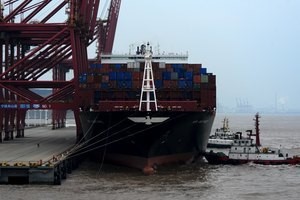By Geoffrey Smith
Investing.com -- Imports into the U.S. fell in April for the first time in nine months, amid signs that slowing demand from consumers is leaving final sellers of goods with too much inventory.
Imports of goods fell by $13 billion to $283.8 billion, with consumer goods accounting for half of that decline, the Bureau of Economic Analysis said on Tuesday. Imports from China alone fell by $10.1 billion, in part, a reflection of growing problems in shipping products out of Shanghai, which entered a two-month stop-start period of lockdown in the month.
Exports, meanwhile, held up better, rising 3.5% on the month to $252.6 billion. Exports of natural gas and petroleum products both rose, as European buyers increasingly turned to the U.S. for alternatives to Russian energy supplies in the wake of Russia's invasion of Ukraine. As such, the trade deficit narrowed from a record $107.7 billion in March to $87.1 billion in April.
The numbers corroborate an increasing trend across the retail sector, which has complained of fresh supply chain problems in sourcing products from China. Various retailers have also struggled to sell everything they did get hold of, with the 40-year high in inflation putting increasing pressure on disposable incomes and spending levels. Separately on Tuesday, retailer Target (NYSE:TGT) was forced to issue its second profit warning in three weeks, after being left with too much unsold inventory after the end of its first quarter.
"In the near term, export demand will continue to face strong headwinds from fragile economic conditions in Europe amid the ongoing war in Ukraine," said Oxford Economics analyst Mahir Rasheed in a note to clients, adding that "the threat of new lockdowns will keep China's growth outlook uncertain despite the reopening of Shanghai."
He said he expects the trade deficit, which widened sharply as the pandemic and the policy response to it created buoyant demand for goods of all types, is likely to moderate in the course of the year, as the Federal Reserve raises interest rates to choke off what it sees as excess demand.
"Aggressive Fed tightening and moderating domestic demand will likely foster more balanced trade flows as imports cool and exports gradually improve," Rasheed said.
